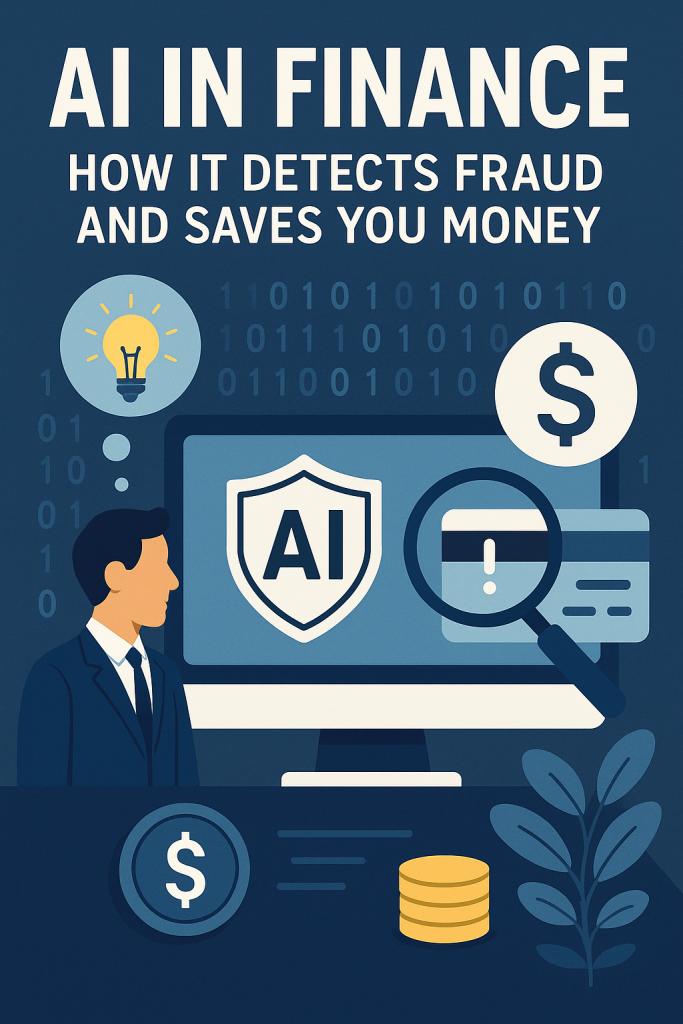Banking today looks very different from just a few years ago. If you have ever gotten a fraud alert on your credit card, used a mobile banking app, or even read about stock market predictions, you may have already experienced the power of artificial intelligence (AI).
The good news is you don’t need to be a tech expert to understand it. AI is simply a set of smart computer programs that can spot patterns, learn from past behavior, and make helpful suggestions. In this guide, we will look at three everyday ways AI is used in finance: detecting fraud, helping with stock market insights, and making banking apps easier and safer to use.
Table of Contents
Key Takeaways
- AI watches for unusual activity on your accounts and can alert you to fraud quickly.
- Stock analysis tools powered by AI help investors spot patterns, though risks still remain.
- Banking apps use AI to provide budgeting tips, reminders, and personalized advice.
- You don’t need to be a tech expert to benefit—AI is already working quietly to protect and assist you.
AI in Fraud Detection: Your Digital Watchdog
One of the most important jobs of AI in finance is spotting fraud. Years ago, banks relied mostly on people to notice and stop suspicious transactions. That process was slow and sometimes missed problems.
Today, AI systems monitor millions of transactions in real time. They look for unusual patterns, such as:
- Purchases in locations far from your home
- Large or repeated withdrawals that don’t match your history
- Online orders from unfamiliar websites
If something looks suspicious, the system quickly alerts the bank. That’s why you may have received a text or phone call asking, “Did you make this purchase?”
Example: Imagine you normally shop for groceries in your hometown. Suddenly, your card is used to buy expensive jewelry overseas. AI instantly spots the difference and blocks the charge until you confirm it.
This quick action saves customers millions of dollars every year. For most people, it’s reassuring to know an invisible “watchdog” is always on duty.

AI in Stock Analysis: Helping Investors Make Sense of the Market
The stock market can feel overwhelming, even for experienced investors. Prices go up and down quickly, and it’s hard to keep track of everything. This is where AI comes in.
AI-powered tools scan huge amounts of financial data—news articles, company reports, and even social media chatter. They look for patterns that might affect stock prices. For example:
- Predicting when a company might perform well based on sales data
- Spotting risks when a company’s costs suddenly rise
- Suggesting investment trends, like renewable energy or healthcare
Important Note: While AI can provide useful insights, it cannot guarantee profits. The stock market always carries risks. Many everyday investors use AI tools more as a guide, not a crystal ball.
Example: Some apps now give users “investment health checks,” showing how balanced or risky their portfolio is. The AI makes it easier to understand complex data in plain language.
AI in Banking Apps: Your Pocket Financial Assistant
If you use a banking app, you may already benefit from AI without realizing it. These apps are becoming like personal financial assistants, offering tools such as:
- Spending summaries that show where your money goes each month
- Budget reminders when you are close to overspending
- Savings tips based on your habits, like suggesting an automatic transfer to a savings account
- Chatbots that answer simple banking questions 24/7
Example: Let’s say you usually spend $200 a month on dining out. If your spending suddenly jumps to $400, the app might send a friendly reminder. This small nudge helps you stay on track and avoid end-of-month surprises.
These features make banking more personalized and less stressful, especially for people who want simple, clear information.
Everyday Benefits of AI in Finance
To put it all together, here’s how AI makes a difference for everyday users:
- Peace of mind: Fraud detection keeps your money safe.
- Clarity: Stock analysis tools explain complicated data in easy-to-read ways.
- Control: Banking apps give you simple budgeting and saving tips.
Most of this happens automatically. You don’t need to set anything up—AI is already built into the services banks and apps provide.
Final Thoughts
AI in finance may sound high-tech, but at its heart, it’s about making banking safer and easier for people like you. Whether it’s catching fraud before it happens, helping investors understand the stock market, or offering helpful nudges through apps, AI is working behind the scenes every day.
The next time you get a fraud alert, see a spending summary in your app, or read about market predictions, you’ll know that AI played a role. And the best part? You don’t need to be a tech expert to benefit from it.
Your money is being watched over, guided, and protected in ways that were never possible before.
